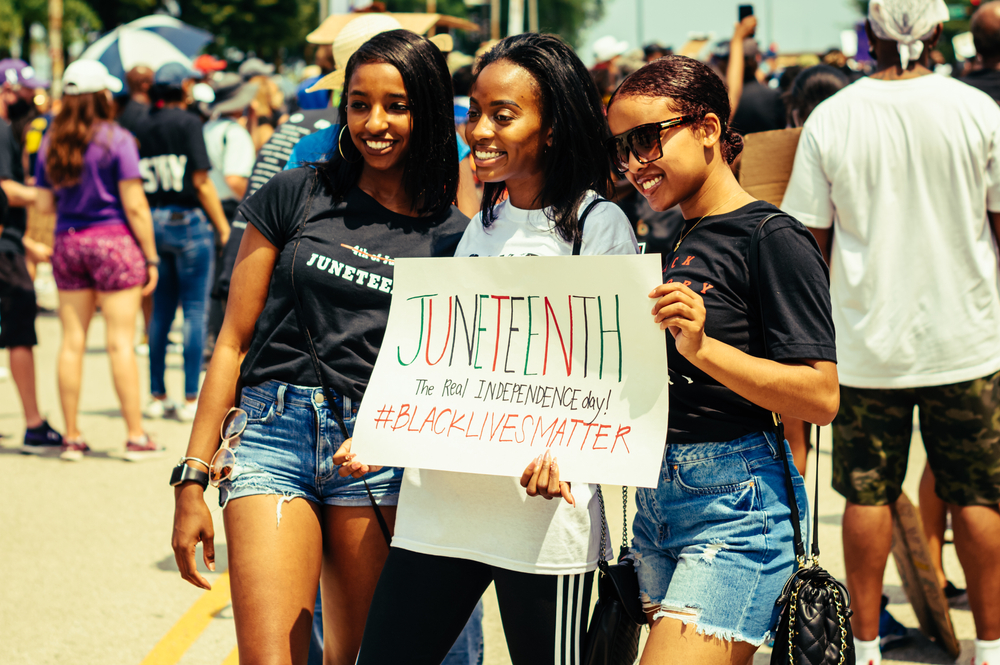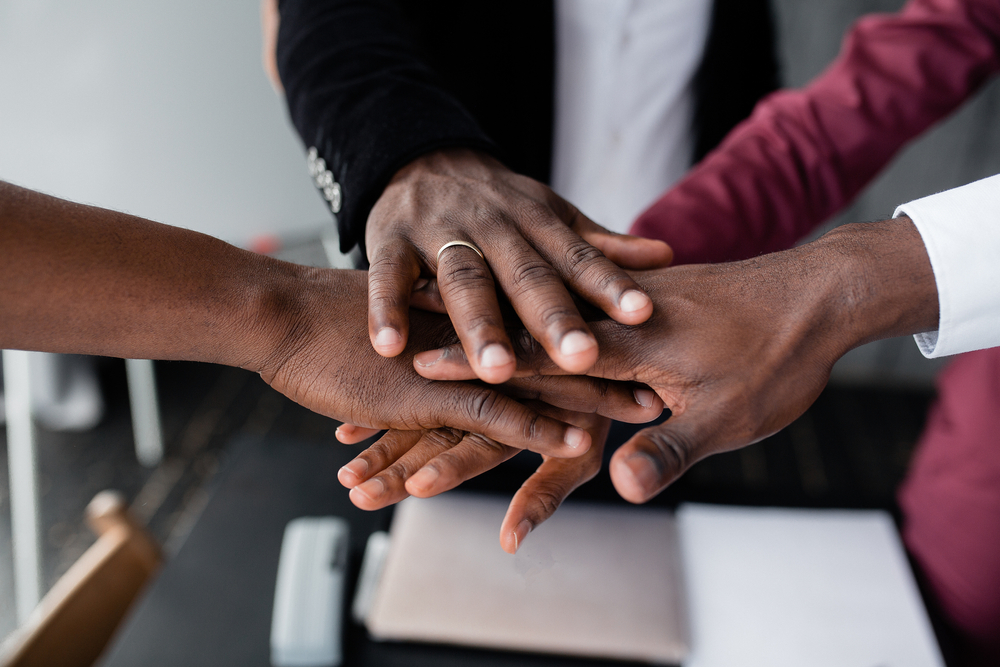What is Juneteenth? Meaning, Importance and Ways to Celebrate

If you’ve been paying attention to the news and keeping up with state laws, you may have noticed the word “Juneteenth” a lot, especially in light of the deaths of George Floyd and Breonna Taylor.
You may be wondering: what is Juneteenth and what is its significance in American history? Here’s a brief guide that will answer all your questions about the federal holiday that’s come to symbolize freedom for many Americans.
Contents:
- Juneteenth: The Whole Explanation
- History of Juneteenth: All You Need To Know
- Why Is Juneteenth Important?
- When Is Juneteenth 2022? How To Celebrate Juneteenth?
- Frequently Asked Questions
Juneteenth: The Whole Explanation

Svitlana Bezuhlova/Shutterstock.com
What Is Juneteenth Day? What Does It Mean?
Juneteenth is an annual holiday that commemorates the abolition of slavery in the United States. While it has only gained popularity and renewed attention recently, it has deeper roots. The day has been observed by African-Americans in various parts of the United States every June 19 since the late 1800s.
Why Is It Called Juneteenth?
The name of the holiday was created by combining the words “June” and “19.” This is the date and month when the Emancipation Proclamation came into effect. It’s also referred to as Emancipation Day, Freedom Day, and Juneteenth Independence Day.
Flag and Colors

AlliesTroop/Shutterstock.com
The design of the Juneteenth flag is meant to provide a visual representation of the slogan: “a new freedom, a new people, a new star.”
It’s the same colors as the American flag: red, white, and blue. This is meant to demonstrate that formerly enslaved African-Americans as well as their descendants are also Americans.
The Juneteenth flag has a star in the middle, which signifies new freedom and the end of slavery in the US. The curved color separation embodies new horizons and opportunities for African-Americans.
History of Juneteenth: All You Need To Know
A Commendable Start
On January 1, 1863, otherwise known as “Freedom’s Eve”, enslaved and free Americans gathered in churches and private houses to pray for a miracle. Their prayers were answered at the stroke of midnight when the Emancipation Proclamation took effect.
Announced during the American Civil War, the Emancipation Proclamation declared all enslaved people in the Confederate States legally free. It was an expected development after the election of anti-slavery President Abraham Lincoln.
To celebrate their historical freedom, Union soldiers, most of whom were black, marched from plantation to plantation and across southern cities, reading copies of the proclamation and spreading the good news.
Unwelcome Technicalities
While the Emancipation Proclamation left an indelible mark, it could not be enforced in Southern states like Delaware and Missouri, where slavery was still legal. It’s one of the reasons why enslaved people in Texas, the westernmost Confederate state, didn’t get their freedom until much later.
The proclamation met with resistance, particularly in the South, where wealthy landowners tried to overturn Lincoln’s anti-slavery efforts.
Seceded states were strongly urged to rejoin the Union before January 1st. As a reward, they would be allowed to keep their slaves and enjoy the fruits of forced labor. However, if these states did not return to the Union, all their slaves would be declared legally free.
Citizens in the Confederate states did not accept Lincoln as their president, which is why slave owners weren’t compelled to free their slaves. The enslaved people in these areas were eventually freed, either through self-liberation or through the intervention of Union forces.
Gaining Momentum

vasara/Shutterstock.com
News of the Emancipation Proclamation reached Texas slowly. This may have been due to the state’s unreliable postal service, but was more likely due to messengers and Union soldiers being forcibly prevented from spreading the word.
Whatever the case, landowners resisted because they prioritized convenience and economics over the lives of those they had enslaved.
On June 19, 1865, Gordon Granger, a Union General, arrived in Galveston, Texas with around 2,000 Union troops. This took place two months after the surrender of Confederate General Robert E. Lee in Appomattox, Virginia with the message that slavery will no longer be tolerated in the state. He informed enslaved African-Americans that the Civil War had ended and that more than 250,000 enslaved black people were now legally free.
This day came to be known as Juneteenth. The newly emancipated people celebrated with prayer and religious events, speeches, eating, singing spiritual songs, and dancing, transforming it into one of the most impressive and inspiring grassroots initiatives of all time.
Ushering In the Thirteenth Amendment
The happy news that came two and a half years after it was issued not only freed slaves in states that recognized Lincoln as president. It also ushered in the Thirteenth Amendment, which read:
“Neither slavery nor involuntary servitude, except as a punishment for crime whereof the party shall have been duly convicted, shall exist within the United States, or any place subject to their jurisdiction.”
This abolished slavery throughout the United States, including states that previously rebelled against the idea. These states would have to abide by the Thirteenth Amendment if they wanted to be reintegrated into the Union. The 13th Amendment, along with the 14th and 15th Amendments, greatly expanded the civil rights of African-Americans.
Reconstruction
The post-emancipation period from 1865 to 1877 was a period of reconstruction, uncertainty, passion, and struggle.
Formerly enslaved people aspired to be reunited with their family members who had become dispersed across the country as a result of slavery. They also established schools.
These rapid changes were nothing short of astounding, especially since they were led by a community that had faced challenge after challenge for hundreds of years, with seemingly no end in sight.
A Bump In the Road
By the 1960s, Juneteenth had been overshadowed by the Civil Rights struggle, however, Martin Luther King, Jr. reignited interest in the event. In 1968, he staged the Poor People’s Campaign on the Juneteenth Solidarity Day.
The day became more popular in the decades that followed as more people became aware of American slavery’s dark history.
State Holiday: A Symbolic Gesture
Texas was the first state to declare Juneteenth an official holiday, and the first state-sponsored celebration was held in 1980. Since then, at least 45 other states have followed suit. Some states such as Texas consider it a state holiday while others regard it as a day of observance.
Efforts To Recognize It As a National Holiday
Efforts to make Juneteenth a national holiday have failed, but that hasn’t stopped campaigners like Opal Lee, a Fort Worth activist, from trying.
On June 17, 2021, President Biden signed the bill into law just two days after the Senate passed the bill, making Juneteenth the 11th holiday in the country. It was put into motion immediately, giving federal employees a day off that same year.
Here’s a video of the first celebration of the federally observed holiday.
Why Is Juneteenth Important?
Juneteenth is a rallying cry for change against racial and sexual discrimination. More recently, it has reenergized the Black Lives Matter movement. Its legacy stresses the importance of civil rights and standing up for what you believe in.
For many, it’s an opportunity to speak out against any form of slavery that still exists.
When Is Juneteenth 2022? How To Celebrate Juneteenth?
Juneteenth 2022 will be celebrated on Sunday, June 19, 2022.
Juneteenth celebrations are focused on the reunification of families, celebrating black culture, history, and life through good music, art, food, and dancing. It also honors those who struggled for justice and freedom and presents an opportunity to celebrate African-American contributions to society.
Here are some ways you can celebrate Juneteenth:
- Find an event, parade, or street that puts the black community in the spotlight.
- Host a backyard party for your family and community to celebrate freedom and emancipation.
- Do business with and buy from African-American-owned businesses to show your support.
- Support black artists’ music, shows, and books to learn about their historical struggles and resilience.
- Visit an art museum dedicated to black culture and learn more about it through creative exhibits.
- Donate to groups that fight for African-American freedom and rights. We may have come a long way but there’s still a lot left to do.
Frequently Asked Questions

Minerva Studio/Shutterstock.com
When Did Juneteenth Become a Federal Holiday?
Juneteenth has been observed in various parts of the United States since 1965 but it was only on July 17, 2021 that President Biden declared it a federal holiday in the United States.
Is It a National Holiday?
Juneteenth is not a national holiday but it is celebrated as a state holiday in Texas and a few other states.
Which States Consider Teaching About Juneteenth Illegal and Why?
Five Republican states — Idaho, Iowa, Oklahoma, Texas, and Tennessee — prohibit the teaching of structural racism, that affects the lives, wellbeing and life chances of some groups of people. Unlike the institutional racism, that disadvantage people of color by prejudice, structural racism make wider political and social problems.
- according to Idaho’s House Bill 377, lessons in critical race theory undermine the objectives of dignity and non-discrimination in public education. They believe that it exacerbates and inflames divisions based on sex, race, national origin, color, and other criteria.
- In Iowa, House File 802 prohibits the teaching of certain concepts about race and sex. Signed by Governor Kim Reynolds, it bans anything that might portray the United States as a whole as fundamentally racist or sexist.
- according to Oklahoma’s House Bill 1775, lessons should not cause an individual to feel discomfort, guilt, grief, or provoke any type of psychological distress on account of one’s race.
- Texas’ House Bill 3979 prohibits public school teachers from requiring their students to study materials that support the premise that “the advent of slavery constitutes the true founding of the US.”
- Tennessee lawmakers believe that teaching about racism encourages division. This is why the teacher should focus on teaching “the exceptionalism of our nation” rather than concepts that “inherently divide” people.
What Will be Closed On Juneteenth?

Monkey Business Images/Shutterstock.com
Markets, banks, the US Postal Service, and non-essential federal offices will be closed on Juneteenth. Most universities, schools, and state offices will also be on holiday. Businesses can decide whether they would like to remain open.
Which Senators Voted Against Juneteenth?
Here are the 14 senators, all Republicans, who voted against making Juneteenth a federal holiday.
- Andrew Clyde, a Georgia Representative.
- Andy Biggs, an Arizona Representative.
- Chip Roy, a Texas Representative.
- Doug LaMalfa, a California Representative.
- Matt Rosendale, a Montana Representative.
- Mike Rogers, Alabama Representative.
- Mo Brooks, an Alabama Representative.
- Paul Gosar, an Arizona Representative.
- Ralph Norman, a South Carolina Representative.
- Ronny Jackson, a Texas Representative.
- Scott DesJarlais, a Tennessee Representative.
- Thomas Massie, a Kentucky Representative.
- Tom McClintock, a California Representative.
- Tom Tiffany, a Wisconsin Representative.
Do You Say Happy Juneteenth?
“Happy Juneteeth” is a fitting way to express your observance of this historic event in the United States.
Is Juneteenth a Paid Holiday?
Juneteenth is a federal holiday. Just like every other federal holiday, companies can choose whether to pay their employees on that day.
Most federal employees are given paid days off on Juneteenth. This also applies to several private companies, including Nike, Civic, One Planet, Spotify, Best Buy, JCPenney, and Target.
Some companies, like the New York Times, allow their employees to take the day as a “floating holiday” which allows them to take a paid day off on a day of their choosing.
Celebrating America’s Second Independence Day

DmitryStock/Shutterstock.com
Celebrating Juneteenth reminds us of the importance of civil rights and freedom. It cautions us against enacting modern forms of slavery that minimize minorities and disregard their value.
By remembering the struggle for basic human liberty, all Americans can have a better appreciation for the freedoms they enjoy today. This is a powerful lesson that families and generations should never forget.
Juneteenth influences how we treat each other, how we respect the diversity in our country, and how we come together as a community.
The US government may have only recently officially recognized Juneteenth as a federal holiday but it is the oldest African-American holiday in history. Continuing to celebrate Juneteenth demonstrates that we’ve grown from conflict and provides assurance that slavery will never dominate the nation as it did almost 160 years ago.
The picture on the front page: Antwon McMullen/Shutterstock.com
Проверьте электронный ящик



















